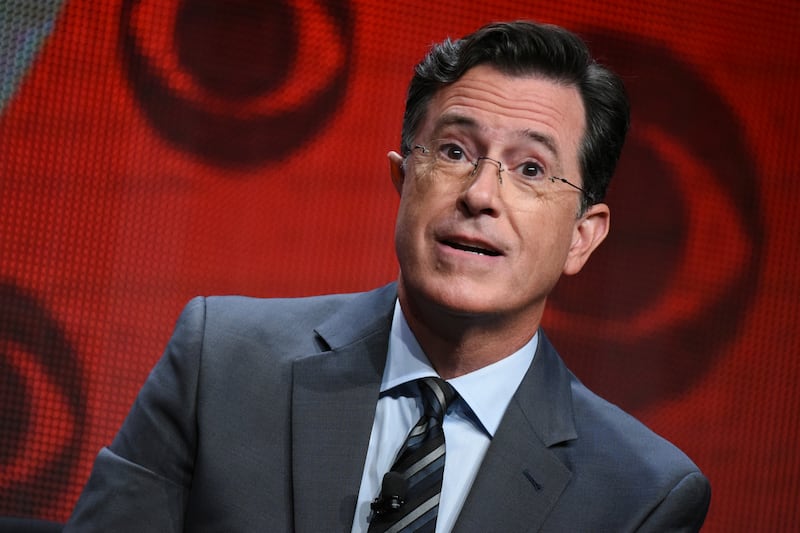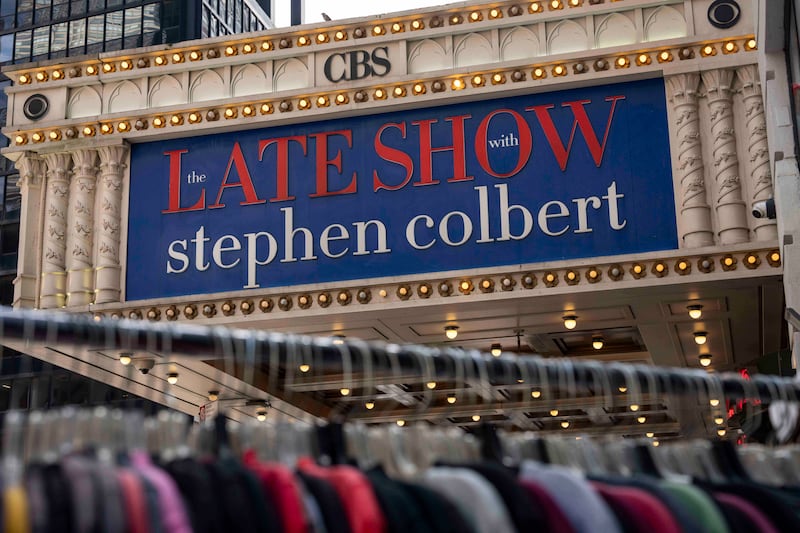In medicine, there’s a saying: When you hear hoofbeats, think horse, not zebra.
That means the most common explanation is more likely than the most exotic one when it comes to making a diagnosis. It’s an adage that applies in almost every aspect of life.
A lot of people are yelling “zebra” right now about Stephen Colbert’s late-night talk show on CBS ending, and by zebra, they mean “Donald Trump.”
Colbert’s announcement Thursday that his show will end next May has been met by howls of protest, and accusations that this is yet another capitulation by Paramount, CBS’s owner, to the president.
Earlier this month, Paramount agreed to a $16 million settlement with Trump over its editing of a Kamala Harris interview on “60 Minutes.” Many analysts saw the decision to settle a lawsuit that Paramount said was without merit (with the payout going to a future Trump presidential library) as the company trying to stay on the good side of the Trump administration as it negotiates a merger with Skydance Media. Some, including Colbert, went so far as to call it a bribe.

The announcement’s timing raised eyebrows, for sure, coming just days after Colbert called out Paramount. But the idea that the Trump administration is ruthlessly silencing its enemies, as some celebrities and politicians have said, has stripes.
There are many other explanations for what has happened that also make sense.
First, CBS’s “Late Show,” which began with David Letterman in 1993, is not “meaningfully profitable,” according to The Hollywood Reporter.
This is not a new development. Two years ago, Variety magazine noted that younger Americans just aren’t that into late-night TV like the baby boomers were at that age and advertising revenue was falling.
The network confirmed that in its official statement about the decision, saying, “This is purely a financial decision against a challenging backdrop in late night. It is not related in any way to the show’s performance, content or other matters happening at Paramount.”
Even CNN’s Brian Stelter, no fan of Trump, said as much, writing: “The bottom has indeed been falling out of the late-night TV business model for several years now. Audience fragmentation and digital competition have led to a decline in ad revenue across the board. One insider described it as ‘cratering’ at CBS.”
For anyone paying attention, this was by no means a shocking announcement. Many people sincerely believe that Donald Trump aspires to be some sort of dictator: Even if that were true, they should know that money was king long before Trump was.
How many viewers does Stephen Colbert have?
“No one is sending Stephen Colbert to the sidelines — not tonight, and probably not next year,” Brian Steinberg wrote for Variety in 2023, and in that “probably” was a warning to Colbert and the 200 other people the show employs.
That number in itself is astonishing. Colbert’s is the most highly rated of the current late-night shows and draws about 2.5 million viewers, per The Hollywood Reporter. That it takes hundreds of people to produce the show seems evidence that legacy talk-shows haven’t woken up to the reality of new media, in which comedians like Theo Von can amass millions of followers on YouTube with little more than a microphone and a couple of friends with whom they can banter.

Writing for Variety, Daniel D’Addario said that other late-night shows have been told to cut costs. He also noted that the late-night show is “a format rooted in the earliest days of television,” a time when “television was a uniting force, a sort of national gathering-place.”
When Johnny Carson and David Letterman ruled late-night TV, their content made for water-cooler conversation the next day at work. Today, our coworkers may have watched Greg Gutfeld, Jimmy Fallon or Jimmy Kimmel if they watched anything at all, as they were just as likely to be looking at livestreams on X or Bluesky, or listening to a podcast. It’s also significant that much of Gen Z is in bed when the late-night shows air.
The Wall Street Journal reported last year that young Americans are going to bed earlier, at 10 and even 9 p.m., cognizant of research that shows the importance of sleep to health. If the Zoomers watch late-night hosts at all, it’s in snippets on social media the next day.
What will Stephen Colbert do next?
Colbert, a family man and devoted Catholic, will be fine on his own, if he doesn’t get an offer elsewhere. He’ll go to YouTube and Substack, or start his own media company, and he still has nearly a year to prepare for what comes next.
But some people are mourning the loss of the late-night show as if it were some venerable institution that held us together with glue and snark. Carson famously eschewed politics on “The Tonight Show”; in fact he was criticized for not taking up more “serious” topics. But his was a safe and genial space for all Americans to convene, unlike today’s more divisive hosts, who shouldn’t be surprised if half of the country doesn’t want to tune in.
This is not to say that the optics of the announcement aren’t great for CBS. But the zebra vs. horse scenario is beautifully presented in two posts on X.
In one, Chris Hayes wrote, “Not really an overstatement to say that the test of a free society is whether or not comedians can make fun of the country’s leader on TV without repercussions.”
To which Drew Holden replied, “Not really an overstatement to say that the test of a free society is whether or not comedians can get paid millions on TV without viewers.”
Hayes’ post is speculative; there is no evidence that the show’s end has anything to do with Colbert’s criticism of Trump.
But high-cost shows do need lots of advertisers and viewers. Until proven otherwise, the horse came for Colbert and “The Late Show,” not the zebra.


